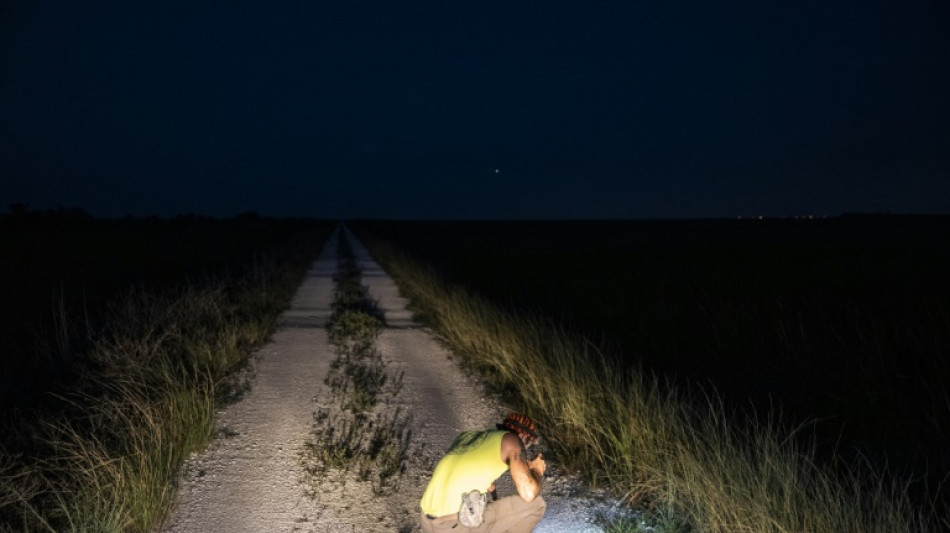
-
 'I wanted to die': survivors recount Mozambique flood terror
'I wanted to die': survivors recount Mozambique flood terror
-
Trump issues fierce warning to Minneapolis mayor over immigration

-
 Anglican church's first female leader confirmed at London service
Anglican church's first female leader confirmed at London service
-
Germany cuts growth forecast as recovery slower than hoped

-
 Amazon to cut 16,000 jobs worldwide
Amazon to cut 16,000 jobs worldwide
-
One dead, five injured in clashes between Colombia football fans

-
 Dollar halts descent, gold keeps climbing before Fed update
Dollar halts descent, gold keeps climbing before Fed update
-
US YouTuber IShowSpeed gains Ghanaian nationality at end of Africa tour

-
 Sweden plans to ban mobile phones in schools
Sweden plans to ban mobile phones in schools
-
Turkey football club faces probe over braids clip backing Syrian Kurds

-
 Deutsche Bank offices searched in money laundering probe
Deutsche Bank offices searched in money laundering probe
-
US embassy angers Danish veterans by removing flags

-
 Netherlands 'insufficiently' protects Caribbean island from climate change: court
Netherlands 'insufficiently' protects Caribbean island from climate change: court
-
Fury confirms April comeback fight against Makhmudov

-
 Susan Sarandon to be honoured at Spain's top film awards
Susan Sarandon to be honoured at Spain's top film awards
-
Trump says 'time running out' as Iran rejects talks amid 'threats'

-
 Spain eyes full service on train tragedy line in 10 days
Spain eyes full service on train tragedy line in 10 days
-
Greenland dispute 'strategic wake-up call for all of Europe,' says Macron

-
 'Intimidation and coercion': Iran pressuring families of killed protesters
'Intimidation and coercion': Iran pressuring families of killed protesters
-
Europe urged to 'step up' on defence as Trump upends ties

-
 Sinner hails 'inspiration' Djokovic ahead of Australian Open blockbuster
Sinner hails 'inspiration' Djokovic ahead of Australian Open blockbuster
-
Dollar rebounds while gold climbs again before Fed update

-
 Aki a doubt for Ireland's Six Nations opener over disciplinary issue
Aki a doubt for Ireland's Six Nations opener over disciplinary issue
-
West Ham sign Fulham winger Traore

-
 Relentless Sinner sets up Australian Open blockbuster with Djokovic
Relentless Sinner sets up Australian Open blockbuster with Djokovic
-
Israel prepares to bury last Gaza hostage

-
 Iran rejects talks with US amid military 'threats'
Iran rejects talks with US amid military 'threats'
-
Heart attack ends iconic French prop Atonio's career

-
 SKorean chip giant SK hynix posts record operating profit for 2025
SKorean chip giant SK hynix posts record operating profit for 2025
-
Greenland's elite dogsled unit patrols desolate, icy Arctic

-
 Dutch tech giant ASML posts bumper profits, cuts jobs
Dutch tech giant ASML posts bumper profits, cuts jobs
-
Musetti rues 'really painful' retirement after schooling Djokovic

-
 Russian volcano puts on display in latest eruption
Russian volcano puts on display in latest eruption
-
Thailand uses contraceptive vaccine to limit wild elephant births

-
 Djokovic gets lucky to join Pegula, Rybakina in Melbourne semi-finals
Djokovic gets lucky to join Pegula, Rybakina in Melbourne semi-finals
-
Trump says to 'de-escalate' Minneapolis, as aide questions agents' 'protocol'

-
 'Extremely lucky' Djokovic into Melbourne semi-finals as Musetti retires
'Extremely lucky' Djokovic into Melbourne semi-finals as Musetti retires
-
'Animals in a zoo': Players back Gauff call for more privacy

-
 Starmer heads to China to defend 'pragmatic' partnership
Starmer heads to China to defend 'pragmatic' partnership
-
Uganda's Quidditch players with global dreams

-
 'Hard to survive': Kyiv's elderly shiver after Russian attacks on power and heat
'Hard to survive': Kyiv's elderly shiver after Russian attacks on power and heat
-
South Korea's ex-first lady jailed for 20 months for taking bribes

-
 Polish migrants return home to a changed country
Polish migrants return home to a changed country
-
Dutch tech giant ASML posts bumper profits, eyes bright AI future

-
 South Korea's ex-first lady jailed for 20 months for corruption
South Korea's ex-first lady jailed for 20 months for corruption
-
Minnesota congresswoman unbowed after attacked with liquid

-
 Backlash as Australia kills dingoes after backpacker death
Backlash as Australia kills dingoes after backpacker death
-
Brazil declares acai a national fruit to ward off 'biopiracy'

-
 Anisimova 'loses her mind' after Melbourne quarter-final exit
Anisimova 'loses her mind' after Melbourne quarter-final exit
-
Home hope Goggia on medal mission at Milan-Cortina Winter Olympics


Hunting pythons in Florida, for profit and therapy
Enrique Galan is seldom happier than when he disappears deep into the Everglades to hunt down Burmese pythons, an invasive species that has been damaging Florida's wetland ecosystem for decades.
When not working at his job staging cultural events in Miami, the 34-year-old spends his time tracking down the nocturnal reptiles from Southeast Asia.
He does so as a professional hunter, hired by the Florida Fish and Wildlife Conservation Commission (FWC) to help control the python population, estimated to be in the tens of thousands.
At night, Galan drives slowly for miles on paved roads and gravel tracks, his flashlight playing on grassy verges and tree roots, and the banks of waterways where alligator eyes occasionally glint.
He charges $13 an hour and an additional fee per python found: $50 if it's up to four feet (1.2 meters), and $25 more for each additional foot.
But on this August night, he has an extra motivation.
The FWC has been holding a 10-day python-hunting contest, with 800 people participating. The prize is $2,500 for whoever finds and kills the most pythons in each of the categories -- professional and amateur hunter.
And Galan would love to win that money to celebrate the arrival of Jesus, his newborn baby.
- Pets released into wild -
Burmese pythons, originally brought to the United States as pets, have become a threat to the Everglades since humans released them into the wild in the late 1970s.
The snake has no natural predators, and feeds on other reptiles, birds, and mammals such as raccoons and white-tailed deer.
"They're an amazing predator," says Galan in admiration.
Specimens in the Everglades average between six and nine feet long, but finding them at night in the wetland of more than 1.5 million acres (607,000 hectares) takes skill and patience.
Galan has a trained eye, as well as the courage and determination needed for the job. After two unsuccessful nights, he spots a shadow on the shoulder of Highway 41: he jumps out of his truck and lunges at the animal, a baby Burmese python.
Grabbing it behind the head to avoid being bitten, he puts it in a cloth bag and ties it with a knot. He will kill it hours later with a BB gun.
A few miles further on, a huge python slithers across the tarmac. Galan again bolts from his truck but this time the snake escapes into the grass, leaving behind a strong musky scent, a defense mechanism.
- Therapy for some -
Galan took an online training course before hunting pythons, but says he learned everything he knows from Tom Rahill, a 65-year-old who founded the Swamp Apes association 15 years ago to help war veterans deal with traumatic memories through python hunting.
For a few hours, Rahm Levinson, an Iraq war veteran suffering from post-traumatic stress disorder, hunts with Rahill and Galan.
"It really helped me through a lot of stuff struggling at home," he said.
"I can't sleep at night and having someone to go out at 12 o'clock, two o'clock in the morning, and catch pythons is something productive and good."
Galan is proud to participate in a project that has eliminated more than 17,000 pythons since 2000.
"One of the best things that I get out of it is the amount of beauty that I'm just surrounded by. If you just look closely, open your eyes and observe, you'll see a lot of magic here."
K.Thomson--BTB


